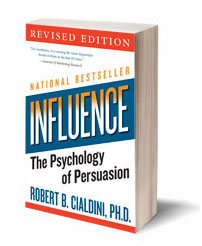 Influence: The Psychology of Persuasion by Robert B. Cialdini
Influence: The Psychology of Persuasion by Robert B. Cialdini
As a life-long learner I’m always looking for new books to read. Sometimes the books aren’t new to market, but they’re new to me. This is one such book. Written back in 1984, “Influence” pre-dates most of the new wave of business books, and you can see a difference in the writing style. It is certainly a more scholarly text, though not a book to grind through. Cialdini, the guru on marketing psychology, puts forward solid examples to outline his research.
In the introduction Robert Cialdini states; “I can admit it freely now. All my life I’ve been a patsy. For as long as I can recall, I’ve been an easy mark for the pitches of peddlers, fund-raisers, and operators of one sort or another.”
Well researched and written over 35 years, the book explains the psychology of why people say “yes” without thinking and how to apply this understanding to everyday life. As consumers, we like to think that we can’t be easily fooled by a salesperson.
A research study provides a good example of this type of “unthinking compliance” which the book reviews. In this study, a researcher asks the subject if she can cut in line to make copies. In each of three scenarios, she says something slightly different with surprising results:
“Excuse me, I have five pages. May I use the Xerox machine because I’m in a rush?” Result: 94% of those asked let her skip ahead of them in line.
“Excuse me, I have five pages. May I use the Xerox machine?” Result: Only 60% of those asked complied.
“Excuse me, I have five pages. May I use the Xerox machine because I have to make some copies?” Result: 93% complied even though no real reason, no new information, was added. Apparently, the reason (“I’m in a rush”) had virtually no impact on the subject letting her cut in line. Rather it was the use of the word “because” that triggered an automatic response in the subject. Cialdini calls this the “click, whirr” response.
Cialdini’s research uncovers six psychological influences that direct human behavior:
- Reciprocation
- Commitment and Consistency
- Social Proof
- Liking
- Authority
- Scarcity
Reciprocation
People are more willing to comply with requests (for favors, services, information, concessions, etc.) from those who have provided such things first. For example, according to the American Disabled Veterans organization, mailing out a simple appeal for donations produces an 18% success rate; but, enclosing a small gift–personalized address labels–boosts the success rate to 35%. If a person who’s selling raffle tickets buys you a coffee, you’re more likely to buy raffle tickets from them.
Consistency and Commitment
From early on we are taught to always keep our promises. People are more willing to be moved in a particular direction if they see it as consistent with an existing or recent commitment. People like and believe in commitment, their image and reputation is what is at stake.
Consider how small that commitment can be and still motivate change forcefully: Gorden Sinclair, a Chicago restaurant owner, was beset by the problem of no-shows—people who made table reservations but failed to appear and failed to call to cancel. He reduced the problem by first getting a small commitment. He instructed his receptionists to stop saying, “Please call if you change your plans” and to start saying, “Will you call us if you change your plans?” The no-show rate dropped from 30% to 10% immediately.
Social Validation
People are more willing to take a recommended action if they see evidence that many others, especially similar others, are taking it. People follow the crowd because they believe in the wisdom of it. One researcher went door to door collecting for charity and carrying a list of others in the area who had already contributed. The longer the list, the more contributions it produced.
Liking/Friendship
Attractiveness, similarity, compliments, contact and cooperation can make a person more influential. People prefer to say yes to those they know and like. For example, research done on Tupperware Home Demonstration parties shows that guests are three times more likely to purchase products because they like the party’s hostess than because they like the products.
Authority
People are more willing to follow the directions or recommendations of a communicator to whom they attribute relevant authority or expertise. Authority can be real or imaginary; people tend to buy from people who have professional titles. Other authority figures include celebrity product endorsements or con artists who use expensive cars and tailored suits to sell every type of product. The well-known study from Professor Stanley Milgram is highlighted, where individuals inflict electric shocks to test subjects who answer questions incorrectly. They do so because they are being instructed to by the authority figure in the white lab coat.
Scarcity
People find objects and opportunities more attractive to the degree that they are scarce, rare, or dwindling in availability. A psychological reaction is attached to this concept; people don’t want to lose. Even information that is scarce is more effective. Cialdini looks at examples of why people get caught up in the frenzy of department store sales, and why cookies that are in scarce supply taste better than those that are in abundance. We can apply this same thinking to collectibles and sporting memorabilia that has little or no inherent value other than the fact that it is rare.
Influence: The Psychology of Persuasion is a book I would recommend to all in business. It has been listed on the New York Times Business Best Seller List and Fortune Magazine lists Influence in their “75 Smartest Business Books.” With endorsements like that how could I not recommend it!
Matthew Page-Hanify is a Calgary-based business coach and trainer specializing in leadership and sales. Please call 403.671.3253 for more information.









